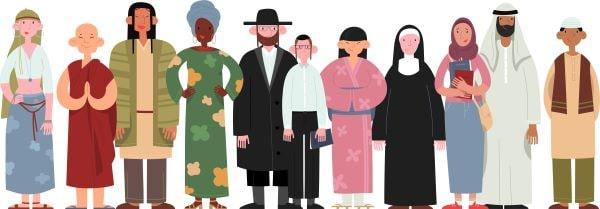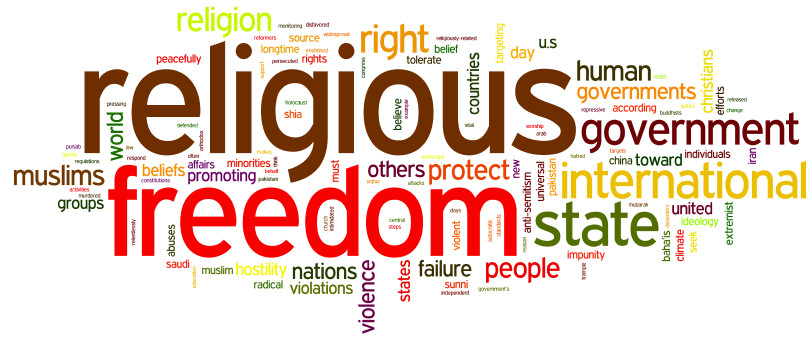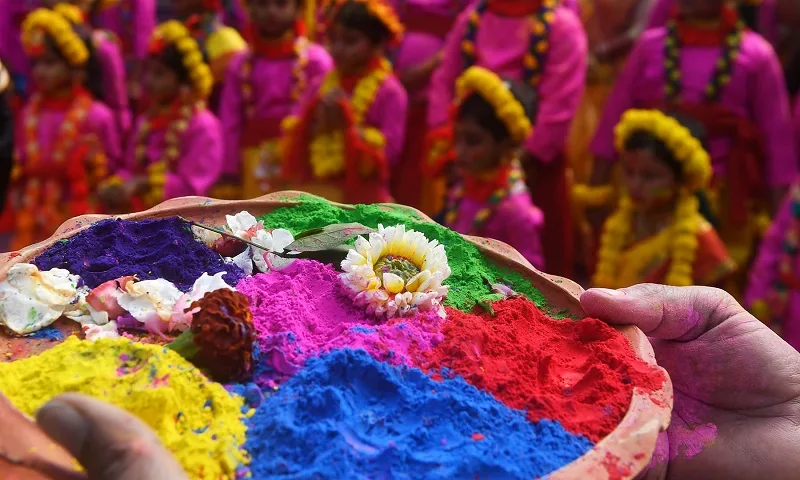
We need to cultivate intercultural understanding to address the growing menace of intolerance, hate, and discrimination in society
Sidra Shaikh
In the spring semester which usually begins after mid-January, we the BS third year 2023 batch of students started off the Anthropology of Religion among other classes at the Department of Anthropology and Archaeology, University of Sindh, Jamshoro, the second oldest university of Pakistan. I was excited and enthusiastic to participate in the Anthropology of Religion course. Before getting enrolled in the Department of Anthropology and Archaeology, I had no idea of this academic field because we at the pre-university schooling level in Pakistan have a commonplace and I would better say limited understanding and information of the variety of fields of knowledge other than medical and engineering. For that matter, at the school level we are usually informed to opt for the professions of medical and engineering sciences that I now think is a kind of enclosing the minds of young students. After entering into anthropology, I came to know that the remarkable feature of this academic field shows the combination of natural sciences, social sciences as well as humanities approaches.
My interest in this field continued to grow and I gradually tried to acquaint myself with its core concepts and methods that pay attention to the holistic approach to studying human society and culture i.e., origin, evolution and past, language, religion, biology as well as current issues of health, education, development, poverty, gender and human rights, and environment and ecology and heritage management and preservation.
 Anthropology presents a diverse approach to studying religion which is different from theological understanding and biases
Anthropology presents a diverse approach to studying religion which is different from theological understanding and biases
In this article, I would particularly focus on the anthropology of religion course and the way it contributed to new learning by demonstrating broad-based approaches and perspectives of religion in human society. Before attending religion anthropology class, I had no idea anthropology presents a diverse approach to studying religion which one may say is different from theological understanding and biases. Before attending the class, coming from a middle-class Muslim background I thought and expected that this course will place a central focus on Islam from a theological perspective. Before the start of the course, it instantly came to mind that this course will help us to understand the origin and theology of Islam as a religion. Being a Muslim rather than an anthropologist, when the word religion comes up it immediately draws my attention toward Islam and not the presence of diverse religions and faith cultures and communities in the world. It may be said that when one thinks as a faith based member of certain religion it fails to look through diversity and variation. In this reductive thinking, this is my general observation that people tend to prioritize their religion or beliefs above everything else. They believe that people should only understand and learn about their own religion and not the exploration and understanding of others. They are fearful that they may become misguided or lose their faith if they do so. This fear is often rooted in the belief of religious communities which is also told and raised by certain religious leaders that one should not come into contact with ‘other’ religions and faith groups. Thus, it may be presumed that the main problem is the way people especially the clergy, theologians, or leaders of religions are at the center of creating differences or in anthropological language the ‘otherness’ of religions. As a result, what happens at the helm of affairs the otherness of religions and religious communities creates hate, discrimination, and exclusion. What happens is that people start to think in biased and exclusionary terms and eventually it gives rise to cultures of intolerance, hate, and violence.
 Against this background, what I am pointing out is that the anthropological approach toward religion presents different perspectives. For me, the anthropology of religion course brought about a new perspective which was quite revelatory and revolutionary as well because it challenged my existing prejudiced understanding and beliefs that I have held toward other religions of the world.
Against this background, what I am pointing out is that the anthropological approach toward religion presents different perspectives. For me, the anthropology of religion course brought about a new perspective which was quite revelatory and revolutionary as well because it challenged my existing prejudiced understanding and beliefs that I have held toward other religions of the world.
The first reading text that we encountered in the course was the pioneering book ‘The Elementary Forms of Religious Life’ by French sociologist Emile Durkheim which brings about the evolutionary and functionalist perspective of religion. Thus, based on the reading of Emile Durkheim we thoroughly discussed the questions of evolution, origins, and definition of religion that go beyond the singular perspective of theologies. Notably, the evolutionary and functionalist approach of Emile Durkheim among other anthropologists of the evolutionary school of thought informs the broader view of the origin of religion by demonstrating its various elementary forms such as animism, totemism, and beliefs in a wide array of supernatural or spirit beings. In a way, Emile Durkheim’s evolutionary and functionalist view presents a lens that puts emphasis on the way primitive human beings’ minds fearful of the powerful forces of nature conceived and helped to take shape the development of primitive beliefs of religion i.e., the belief in supernatural beings.
According to evolutionary anthropologists, primitive humans lived a hunting-gathering life, and they were hunter-gatherers for thousands of years before they adapted to the sedentary agricultural mode of life. The primitive humans learned to make and use stone tools, created cave paintings and art that also show primitive forms and representations of religion and most remarkably primitive humans had a direct and intimate connection with nature from about 2.6 million years ago to around 10,000 BCE. When primitive humans witnessed and experienced natural phenomena such as thunderstorms, winds, flowing waters, rocks, sun and night, earthquakes, death, dreams, and other events that were beyond their understanding they attributed the power to them and thereby evolved the belief in supernatural beings. The primitive people believed that death was a journey of souls from one world to another and the spirits of the deceased always wandered in this world. This is how the belief in spirit beings, says the evolutionary theory of religion, developed and continues to exist among humans. For this reason, anthropologists have explored that since ancient times people have adapted to perform ancestor worship rituals which may not necessarily be judged through modern scientific explanations. This is to point out that the evolutionary thinking of religion gives primacy to the gradual process of change in the development of religious beliefs among humans from the primitive religion of animism – the belief in spirit beings – to monotheism. What lies at the heart of this theoretical thinking is that it calls attention to the historical factors and contingency and the workings of the human mind in evolutionary conditions and adaptability mechanisms. Moreover, anthropology’s social approach to studying religion presented a new understanding that I was unreflective about before attending this course.

Anthropological view of religion provides new insight into the question of the operations of power and force of religion in Muslim societies
Another important reading text and discussion in the anthropology of religion course that broadened my perspective of religion was ‘Genealogies of Religion: Discipline and Reasons of Power in Christianity and Islam’ by Talal Asad. Premised on Talal Asad’s pioneering work in the anthropology of religion we got familiar with the idea of religion and its disciplinary power and reason in Christianity and the way, Talal Asad points out, the ‘separation of religion from power is a modern western norm’. In the context of medieval Christianity, Talal Asad draws attention to the power of religion that worked through the legal institutions and authorized different categories of knowledge as well as shaped the selves. Talal Asad’s view calls for examining the discursive and non-discursive elements in the construction of religion. In other words, his critical discussion demonstrates new insights into the examination of power in the formation of religious truth claims. In this way, it may be said that Talal Asad’s viewpoint suggests taking account of the workings of religious power through authoritative discourses. I understand that this anthropological view of religion provides new insight into the question of the operations of power and force of religion in Muslim societies. One may argue that Talal Asad’s view of religious power through authoritative discourses resonates with the coercive power of religion in Afghanistan, Iran, and Pakistan as well. Likewise, in India, the use of religious power can be observed in the rise of Hindu fundamentalist nationalism.
 It is to point out that the anthropology of religion course included varied topics and reading texts. In this regard, for me, the most remarkable and new topic was Fatima Mernissi’s incredibly scholarly work on Women and Islam. Before attending this class, I never heard of and been involved in such a new historical view and understanding on the question of women in Islam. Fatima Mernissi’s work informed a case for the historical presence and visibility of women in early Muslim societies such as in Medina. Her work informs a historical inquiry into the misogynistic interpretation and construction of Islamic texts. I understand that Fatima Mernissi’s scholarly work merits special attention to address the dismal situation of women’s rights in majority Muslim societies in current times. It can safely be said that the anthropology of religion has nourished a new understanding that calls for respect and regard for religions.
It is to point out that the anthropology of religion course included varied topics and reading texts. In this regard, for me, the most remarkable and new topic was Fatima Mernissi’s incredibly scholarly work on Women and Islam. Before attending this class, I never heard of and been involved in such a new historical view and understanding on the question of women in Islam. Fatima Mernissi’s work informed a case for the historical presence and visibility of women in early Muslim societies such as in Medina. Her work informs a historical inquiry into the misogynistic interpretation and construction of Islamic texts. I understand that Fatima Mernissi’s scholarly work merits special attention to address the dismal situation of women’s rights in majority Muslim societies in current times. It can safely be said that the anthropology of religion has nourished a new understanding that calls for respect and regard for religions.

Before concluding, I would like to refer to the federal Higher Education Commission’s June 20, 2023 letter, circulated country-wide, barring the universities from celebrating thousands of years old cultural festival of Holi. The HEC withdrew its contentious circular within couple of days after widespread condemnation, but while going through the circular, I was stunned to read the language used by HEC chairperson in 2nd paragraph, which was utterly opposed to what it proclaimed in 3rd paragraph of circular that ‘There is no denying the fact that cultural, ethnic and religious diversity leads towards an inclusive and tolerant society that profoundly respects all faiths and creeds.’ (Image of 2nd paragraph of HEC Circular produced here).
I believe that anthropology is not just a subject, but a lens that teaches you to view all religions and their rituals and practices with equal respect. I understand that we need to cultivate intercultural understanding to address the growing menace of intolerance, hate, and discrimination in society.
______________
 Sidra Shaikh is BS third year student at the Department of Anthropology and Archaeology, University of Sindh, Jamshoro, Sindh, Pakistan.
Sidra Shaikh is BS third year student at the Department of Anthropology and Archaeology, University of Sindh, Jamshoro, Sindh, Pakistan.
[…] Also read: Anthropology infuses new understanding of religion […]